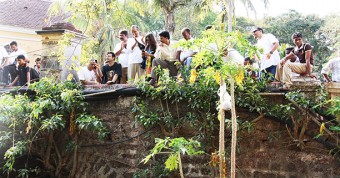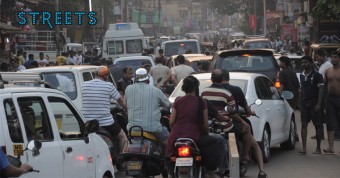If you are in a village, a rooster sitting on a low mango tree branch would have just crowed for the first time that morning. In a town like Panjim, a rolled up newspaper would have just thudded against your front door. The little Manojes, Johns, Miras and Dianas are already in a frenzy, running from the bedroom to the bathroom, from their cereal to their notebooks, parents ordering teeth brushed and shoes tied and uniforms on.
This is school time in the morning. Except perhaps for a fortunate highly organize few, the ritual often comes with a hefty dose of stress.
Contrast this with what the morning must have been like for Margao-based Avinash Ravi Anuj Almeida when he was still school aged.
Now 18, Avinash would wake up at 6.30 am just like his peers. But there was no fear of missing his school bus or being late for assembly. He didn’t have to gulp down his breakfast or put on his clothes as quickly as a theatre actor between scenes.
Rather, he would wake up with a serene smile – a fact high on his recall list when I asked him to explain his home-schooling days.
“Learning is so much fun and I will learn something new today at my own pace,” is how Avinash explains his attitude during this period. He is now in STD XII and swears by the home schooling formula.
Avinash was home-schooled thanks to his mother Maria, who had sensed some red flags with her son’s ability to handle conventional schooling.
“When Avinash was in first standard he had difficulty in writing. He was always busy with his homework, he did not even have the time to talk. As a result Avinash became an introvert,” Maria told Streets.
The thought of home-schooling had crossed her mind, but without much information about the concept, Maria “was afraid to keep him at home”.
By the time Avinash hit standard VIII, he still seemed to have a hard time getting out of his shell. That was when Maria thought it was time to take that tough call, for Avinash and her other two children as well.
Her gamble appears to have paid off.
Today, Avinash not only has time to talk to his parents but seems far more comfortable in his own skin.
He attends music classes at Kala Academy, and undertakes treks and excursions.
“A kid who had no friends now has friends from all walks of life, lawyers, doctors and whenever I need some contacts, I ask him,” his mother quips.
Of the many issues Goa has grappled with over the years, dearth of quality education is certainly not one which has received a great deal of public attention.
Yet the issue of quality education is finding murmur and debate in Goa, especially in homes where parents expect more than they’re getting now.
Take the story of Porvorim-based Valentine and Anna Coelho, for instance. The couple moved to Goa from Mumbai in 1992 with two sons and three daughters. It did not take the Coelhos long to get disillusioned with the education system here, where students are often crammed like sardines in stuffy classrooms.
“We were not happy with the school, values were not upheld, there were too many students in one class – sometimes 75 students in one class,” Anna says, adding that the medium of instruction in Konkani and unfriendly teachers also did not help matters.
“Beside regular lessons we also teach our children other activities such as baking, cooking, painting, reading, etc,” she says.
Parents like Anna are also very nervous about what she calls undue pressure exerted on the students, allowing “little scope for creativity” and harming the children’s mental health.
Dr. Celsa Pinto is a teacher-bureaucrat who has been at the centre of Goa’s primary and secondary education systems for many years. She admits that the present system does suffocate creativity, but to redeem Goa’s basic education credentials, she believes in a full day of schooling as opposed to the current practice of five schooling hours per day.
“Five hours school is not enough. A full day school will help teachers to complete their syllabus and will also give enough opportunity for the students to showcase their creativity and talent,” said Celsa.
The Education Department, she says, accounts for the fourth highest budgetary spend, but more than 90 per cent of the department’s allocated monies are diverted towards the payment of salaries, leaving only 10 percent for all other needs.
No wonder Goa suffers from that same ill plaguing schools throughout India: a two-tier system consisting of substandard public schools and more palatable private schools, accessible to those who can afford it.
Yet even the private schools face quite a bit of criticism.
Creativity in education techniques scores high on Majorda-based Milagres Pereira’s checklist. A father of five children, Milagres laments what he says is too much focus on marks gained during an examination.
“Every child is different and parents are in a better position to understand their children than the teacher. They do not allow the child to think out of the box,” he says.
Milagres’s daugther won first prize in a contest he organized with other children for coming up with a concept of a futuristic car which runs on chocolates rather than fuel in the year 2025. This, he says, is the kind of result he’s getting from the decision to home school his children.
Home schooling may give you the flexibility and ease to learn and study at your own pace, but the onus of administering education lies solely on the parents’ shoulders. It is not easy.
“Parents have to be on their toes. Teaching is sacrifice and dedication and if it is spent within the house, it’s worth it,” says Milagres, making the point that while public schooling is just a few centuries old, home schooling has been around forever.
So don’t children who are deprived of a more social school environment end up less prepared to deal with social engagements? Milagres, a social activist and an artist, said that if properly engineered, home schooling actually works wonders as a social engine.
Milagres has brought together ten families who home-school their children and he regularly organizes workshops and programmes for them. The parents also make it a point to send their children to Bal Bhavan and other social skill enhancing venues.
“What they are missing in school they make up by participating in church activities and by interacting with their village friends,” says Anna.
Developmental and behavioural paediatrician Nandita Souza, however, differs with Anna and Milagres.
In home schooling, she says, the child does not get the benefit of the social aspects of schooling. But she acknowledges that conventional schools are often below the mark, focusing too much “on academic performance and high marks rather than building social skills, self confidence, strengthening talents of children and developing vocational subjects such as carpentry, horticulture, art, etc.”
Home schooling, of course, is not the only alternative in Goa.
Schools like Sharada Mandir, Don Bosco or St. Mary’s often get high marks for their academics, despite criticism about what some believe is their rigid approach. Many people, especially foreigners living in Goa, opt for more laid-back schools such as Sunshine, Green Meadows, the Yellow House or the European School.
Parents sending their kids to these schools often complain that the education falls short of the high standards of the best schools in the large Indian metros or abroad.
If they can afford it, parents worried about less-than-excellent educational opportunities in Goa sometimes opt for niche private schools across the country.
Jamshed, owner of the popular J&A’s Italian restaurant near the Baga bridge, has sent his son Zal Mado to the Hebron international school in Ooty, Tamil Nadu. And Zal loves it.
“We went through the regular school. That does not mean that our children, too, should go through the same. I did not want my son to learn by rote,” says Jamshed, praising the Hebron School for its academics as well as its emphasis on music, art and sports.
Of course sending children to a different city for their education is not for everyone. Especially those who believe they can provide the best option right at home.




